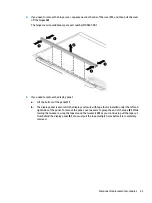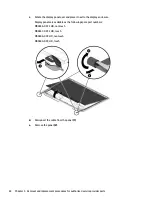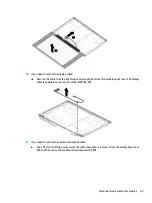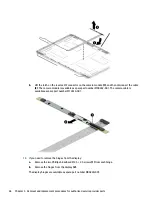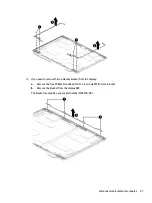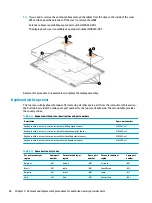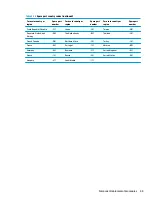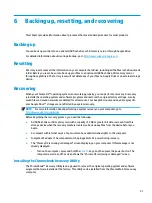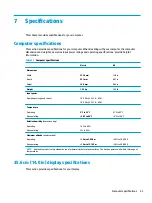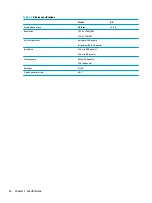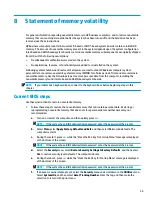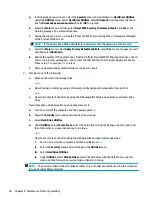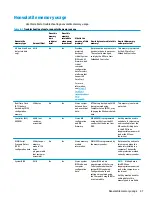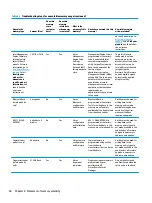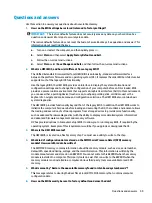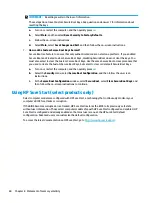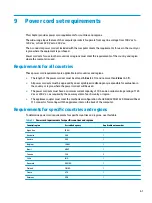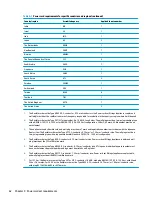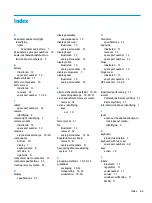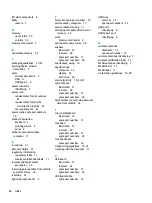
Nonvolatile memory usage
Use this table to troubleshooting nonvolatile memory usage.
Table 8-1
Troubleshooting steps for nonvolatile memory usage
Nonvolatile
memory type
Amount (Size)
Does this
memory
store
customer
data?
Does this
memory
retain data
when power
is removed?
What is the
purpose of this
memory?
How is data entered into this
memory?
How is this memory
write-protected?
HP Sure Start flash
(select models
only)
8 MB
No
Yes
Provides
protected
backup of
critical System
BIOS code, EC
firmware, and
critical
computer
configuration
data for select
platforms that
support HP
Sure Start.
For more
information,
see
Sure Start
(select products
only)
on page 60
Data cannot be written to this
device via the host processor.
The content is managed
solely by the HP Sure Start
Embedded Controller.
This memory is protected
by the HP Sure Start
Embedded Controller.
Real Time Clock
(RTC) battery
backed-up CMOS
configuration
memory
256 bytes
No
Yes
Stores system
date and time
and noncritical
data.
RTC battery backed-up CMOS
is programmed using
Computer Setup (BIOS), or by
changing the Windows date &
time.
This memory is not write-
protected.
Controller (NIC)
EEPROM
64 KB (not
customer
accessible)
No
Yes
Stores NIC
configuration
and NIC
firmware.
NIC EEPROM is programmed
using a utility from the NIC
vendor that can be run from
DOS.
A utility must be used to
write data to this memory
and is available from the
NIC vendor. Writing data
to this ROM in an
inappropriate manner will
render the NIC non-
functional.
DIMM Serial
Presence Detect
(SPD)
configuration data
256 bytes per
memory
module, 128
bytes
programmable
(not customer
accessible)
No
Yes
Stores memory
module
information.
DIMM SPD is programmed by
the memory vendor.
Data cannot be written to
this memory when the
module is installed in a
computer. The specific
write-protection method
varies by memory vendor.
System BIOS
9 MB
Yes
Yes
Stores system
BIOS code and
computer
configuration
data.
System BIOS code is
programmed at the factory.
Code is updated when the
system BIOS is updated.
Configuration data and
settings are entered using
the Computer Setup (BIOS) or
a custom utility.
NOTE:
Writing data to
this ROM in an
inappropriate manner can
render the computer non-
functional.
A utility must be used for
writing data to this
memory and is available
Nonvolatile memory usage
57
Summary of Contents for Pro c640 Chromebook
Page 4: ...iv Safety warning notice ...
Page 7: ...Index 65 vii ...
Page 8: ...viii ...
Page 12: ...4 Chapter 1 Product description ...
Page 32: ...24 Chapter 4 Removal and replacement procedures preliminary requirements ...
Page 58: ...50 Chapter 5 Removal and replacement procedures for authorized service provider parts ...
Page 72: ...64 Chapter 10 Recycling ...

